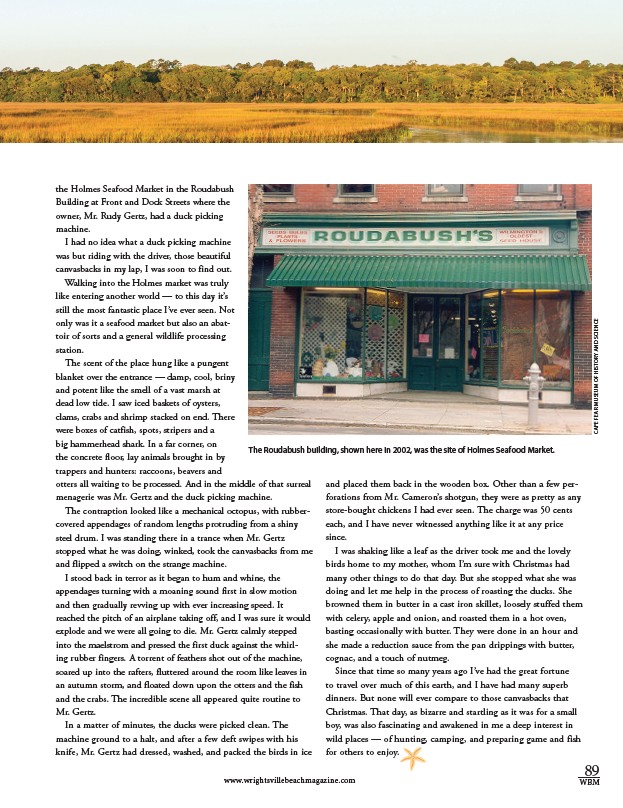
The Roudabush building, shown here in 2002, was the site of Holmes Seafood Market.
store-bought chickens I had ever seen. The charge was 50 cents
each, and I have never witnessed anything like it at any price
since.
I was shaking like a leaf as the driver took me and the lovely
birds home to my mother, whom I’m sure with Christmas had
many other things to do that day. But she stopped what she was
doing and let me help in the process of roasting the ducks. She
browned them in butter in a cast iron skillet, loosely stuffed them
with celery, apple and onion, and roasted them in a hot oven,
basting occasionally with butter. They were done in an hour and
she made a reduction sauce from the pan drippings with butter,
cognac, and a touch of nutmeg.
Since that time so many years ago I’ve had the great fortune
to travel over much of this earth, and I have had many superb
dinners. But none will ever compare to those canvasbacks that
Christmas. That day, as bizarre and startling as it was for a small
boy, was also fascinating and awakened in me a deep interest in
wild places — of hunting, camping, and preparing game and fish
for others to enjoy.
CAPE FEAR MUSEUM OF HISTORY AND SCIENCE
89
the Holmes Seafood Market in the Roudabush
Building at Front and Dock Streets where the
owner, Mr. Rudy Gertz, had a duck picking
machine.
I had no idea what a duck picking machine
was but riding with the driver, those beautiful
canvasbacks in my lap, I was soon to find out.
Walking into the Holmes market was truly
like entering another world — to this day it’s
still the most fantastic place I’ve ever seen. Not
only was it a seafood market but also an abat-toir
of sorts and a general wildlife processing
station.
The scent of the place hung like a pungent
blanket over the entrance — damp, cool, briny
and potent like the smell of a vast marsh at
dead low tide. I saw iced baskets of oysters,
clams, crabs and shrimp stacked on end. There
were boxes of catfish, spots, stripers and a
big hammerhead shark. In a far corner, on
the concrete floor, lay animals brought in by
trappers and hunters: raccoons, beavers and
otters all waiting to be processed. And in the middle of that surreal
menagerie was Mr. Gertz and the duck picking machine.
The contraption looked like a mechanical octopus, with rubber-covered
appendages of random lengths protruding from a shiny
steel drum. I was standing there in a trance when Mr. Gertz
stopped what he was doing, winked, took the canvasbacks from me
and flipped a switch on the strange machine.
I stood back in terror as it began to hum and whine, the
appendages turning with a moaning sound first in slow motion
and then gradually revving up with ever increasing speed. It
reached the pitch of an airplane taking off, and I was sure it would
explode and we were all going to die. Mr. Gertz calmly stepped
into the maelstrom and pressed the first duck against the whirl-ing
rubber fingers. A torrent of feathers shot out of the machine,
soared up into the rafters, fluttered around the room like leaves in
an autumn storm, and floated down upon the otters and the fish
and the crabs. The incredible scene all appeared quite routine to
Mr. Gertz.
In a matter of minutes, the ducks were picked clean. The
machine ground to a halt, and after a few deft swipes with his
knife, Mr. Gertz had dressed, washed, and packed the birds in ice
and placed them back in the wooden box. Other than a few per-forations
from Mr. Cameron’s shotgun, they were as pretty as any
www.wrightsvillebeachmagazine.com WBM